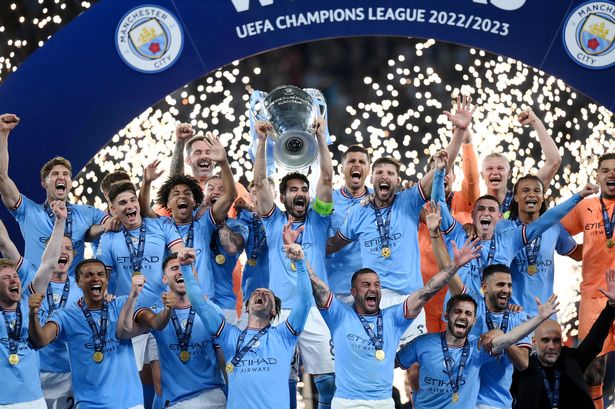It always seemed like a matter of time. Considering their domestic dominance in recent seasons, Manchester City’s struggles in the Champions League under Pep Guardiola were baffling, but they got there in the end. The Premier League winners beat Inter 1-0 on Saturday night to win the European competition for the first time in their history and in doing so, completed a historic treble.

There was no shortage of conversation on Guardiola’s magnificence, where this squad rates among the very greatest, and how the players will be “forever immortal” following their victory throughout the five and a half hours of BT Sport coverage of what is the last Champions League final the channel will broadcast. True, Pep has revolutionized football, and his City team is outstanding. One question, however, went unasked as well as unaddressed.
There was no mention of how the City project was funded, nothing on the 115 alleged breaches of the Premier League’s Financial Fair Play regulations, which are still under investigation, and nothing about the prior European ban, as noted on Twitter by journalist Nick Harris who studies the relationship between sport and money.

On social media, plenty of people were talking about all of that. Shortly after the final whistle sounded in Istanbul, 115 FFP became a trending topic on Twitter. And after City’s 4-0 win over Real Madrid in the semi-final second leg last month, Lance Armstrong had been trending in relation to the Manchester club.
Armstrong was stripped of his seven Tour de France titles after he admitted to using performance-enhancing drugs in each of his victories. For their part, City are accused of a different type of doping: the financial kind. And although the club continue to maintain their innocence, their two-year Champions League ban was only dismissed after the breaches could either not be established or were time-barred.
UEFA’s investigation into City began in March 2019 after emails and documents were leaked to German magazine Der Spiegel in November 2018. Some of those documents appeared to show that City’s owner, Sheikh Mansour bin Zayed al-Nahyan, who on Saturday attended only his second City game since acquiring the club in 2008, was largely using UAE airline Etihad to fund the £67.5m annual sponsorship of the club’s shirt, stadium and academy. One email also suggested that Mansour was using his own vehicle company for the City ownership, the Abu Dhabi United Group, in order to overstate sponsorship income. The Court of Arbitration for Sport (CAS) later ruled that City “did not disguise equity funding as sponsorship contributions”, but they were still fined €10 million for “obstruction of the investigations”.
Meanwhile, City have been accused by the Premier League of 115 breaches of financial rules between 2009 and 2018, failure to assist with the investigation from 2018-19 to 2022-23, overstating sponsorship income and hiding true revenue, not fully disclosing player wages, breaking PL profit and sustainability rules, not complying with UEFA Financial Fair Play regulations and more.
In addition, City have faced accusations of sportswashing, with Amnesty International critical of the club’s Abu Dhabi owners’ attempts to clean up their nation’s “deeply tarnished image” by pouring money into the Premier League side.
All of that probably explains why so many seem indifferent to City’s success. Yes, the football is brilliant and the manager is a genius; yes, some other clubs have spent just as much or even more than the €1 billion outlay on players in Guardiola’s time without the same success in recent years; and yes, those teams may have used dubious means to fund projects in the past. But none of that makes the rule-breaking or financial doping acceptable.
Of course, City could yet be found innocent of these charges. But unless or until that happens, there will be a big asterisk alongside their list of achievements – and it simply has to form part of the conversation. In the meantime, all the fawning over their success seems somewhat unpalatable, really.

